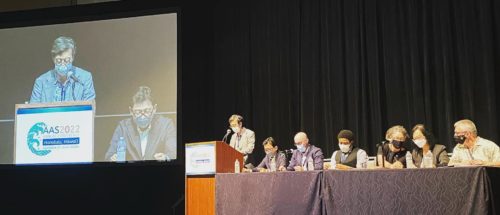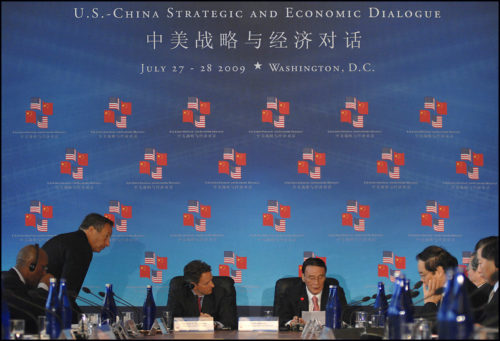Are Chinese and Western perspectives incompatible in our post-truth times?

We make much ado of “building bridges” and “deepening understanding” between China and the West. But this is easier said than done. Increasingly, we are being reminded that it’s not different values that clash, but different realities.
Illustration by Marjorie Wang

Thousands of international students flock to China every year. A lucky and talented few belong to ultra-competitive, fully-funded degree programs. Leading the pack among these are the Yenching Academy at Peking University and the newer, shinier Schwarzman Scholarship Program at Tsinghua University — the alma mater of President Xi Jinping and his predecessor, Hu Jintao.
Where Yenching hopes to “build bridges,” Schwarzman aims to “deepen understanding,” both “between China and the rest of the world.” This talk of transnational amity is compelling. However, in a world of tariffs, Uyghur concentration camps, racialized theories of conflict emanating from the U.S. State Department, alleged profiling of Chinese students at U.S. schools, Huawei bans and arrests, detained foreign nationals in China, and protests in Hong Kong, it is worth asking: How much “deepening” and “bridge-building” is possible, particularly between Western and Chinese students?
Having spent a year in one of these programs, I have my own sense of the critical limitations.
Before suggesting where deepening stops and bridge ropes fray, it must be noted that many students complete study programs in China enamored with the country. Many graduate with enduring friendship groups comprising Western and Chinese peers. Many are confident that their programs fulfill their missions. Students in the fold can attest to this. But speaking for myself, and for some others, I can say this: I left China more disillusioned than enamored. I did not make as many Chinese friends as I would have liked — very possibly at my own fault. And I believe there is some distance to go before any international study program in China can profess to have comprehensively deepened mutual understanding and built bridges, much as they are committed to this objective.
I identify three major forces inhibiting bridge-building between Chinese and Western students. The first force is pedagogical, the second is structural, and the third is political. The Schwarzman program does not induce these problems so much as expose them. Schwarzman is the springboard for this article, not its target. The problems I outline can manifest in any discursive environment home to Chinese and Western viewpoints. As such, identifying them and reaching for resolutions matters to governments as much as degree programs.
I. Pedagogy
Who can say what about China?
This is a polarizing question, particularly in an international study program devoted to deepening understanding around China. On one end, Western participants would answer: “Anyone and anything.” They would continue: “We are here to learn about China, so give me a microscope, and if necessary, a hammer and chisel.” This line of thinking belongs to a liberal academic tradition in which inquiry is virtuous and necessary, and ought to go untrammelled. Yet, this line of thinking is easily construed as something else: arrogant and reckless.
On the other extreme, occupied mainly by Chinese scholars, the who part of the question is answered as follows: “People who properly understand Chinese culture.” They answer the what part like so: “That which is appropriately sensitive.” This line of thinking assumes the super complexity of the Chinese experience, and is mindful that open discourse can have sociopolitical repercussions. However, this line of thinking may be construed as censorial, in so far as one needs a key inscribed “Chinese culture” to offer dissent.
Juxtaposing these distinct mindsets, it is easy to see how conflict can take hold in a politics classroom, or in the Q-and-A section of a speaker address. And so it did. My criticism of the Belt and Road Initiative in one class was rebuffed by my “not understanding Chinese culture” — a comment some Chinese scholars applauded on their feet. The same riposte was used with even greater audible support against an American peer when he advanced the case for Chinese democracy. These jeering responses seemed straight out of the British parliament, but were alienating rather than familiar. They accentuated pedagogical differences between Chinese and Western students.
These examples, with their emotional reactions, bear out another pedagogical point of departure between some Chinese and Western students — namely, that Western students believed their political critiques could be mundane and depersonalized, while some Chinese students received these critiques as barbed and insulting. This difference was borne out strongly when a British peer described China as a “surveillance state” in a cohort’s WeChat group. The comment was intended as a throwaway, and was submerged in an exceptionally banal context. But the backlash was intense. A Chinese peer sent a long repudiation in the same group, assisted by a string of applause emojis from Chinese group members.
Most interesting here is not the somewhat puerile response, but the pedagogical disconnect. One side did not assume political critique would be taken as grand personal affront. The other assumed this critique was all prejudice and ignorance. Ultimately, one side belongs to an environment in which public critique is casual, fired left, right, and center, against one’s own government, other governments, even one’s own party. It is a means to truth, reform, or even comedy. The other side belongs to a different discursive environment, but more importantly, is put on the defensive while outsiders, without proper knowledge of Chinese language or history, deride their government at every opportunity.
An argument can be made here about nationalism, censorship, and indoctrination: It could be said that the Chinese students in question bristled at critique because they view their country uncritically, believe it is always singled out unfairly, and are not accustomed to hearing such open criticism. While elements of this are true, I do not want to do my peers the discredit of reducing their discomfort to being “brainwashed.” There is something intrinsically human about repelling external criticism of a thing to which you belong, whether that be a country, a sports team, or a scholarship program. At times, it is hard for Western scholars to realize their academic (or sometimes comic) subject is somebody’s home. At times, it is hard for Chinese scholars to allow their home to be an academic or even comic subject.
Ultimately, a weak grasp of pedagogical differences can have corrosive effects in classroom and social contexts, leaving Western scholars alienated by censorship and reactionary behavior, and Chinese scholars alienated by a sense of victimization. This gets into the question of structural differences.
II. Structure
Who are international study programs in China for?
Chinese leaders and media love the language of win-win. Programs like Yenching and Schwarzman embody this seductive idea. The Chinese host university gains repute and prestige (Tsinghua accelerated up the world rankings after the opening of Schwarzman College), while a flow and counter-flow of ideas, funding, and networks benefit talented foreign and domestic students alike. Unfortunately, this virtuous circle is easily interrupted, creating friction and inhibiting bridge-building.
Both Schwarzman and Yenching frame themselves as catering equally toward “China” and the “rest of the world.” However, whereas China is a stable entity, “rest of the world” is amorphous. Where China is the location of the programs, “rest of the world” is diffusely home to its participants. Where China is the center of the curriculum, “rest of the world” contains fodder for comparative study. These differences do not mean that one side benefits more than the other. But it introduces asymmetries and unintended consequences. There are two major ones:
The first is that Chinese students can be reduced to resources. This can be social and academic. Chinese students might become de facto translators for people: asked to speak to Didi drivers on the phone, to assist with Taobao orders, but never asked to lunch. Equally, Chinese students might be asked for comment on Chinese historical or political issues in casual settings, something that could potentially be inappropriate or irritating. While this might look like poor social grace from Western scholars, I would again like to give my peers the benefit of the doubt. International study programs entail a host-guest paradigm. Guests are typically reliant on hosts, especially if bewildered by language. Foreign students in China must offset their bewilderment against the risk of being socially extractive.
The second unintended consequence also relates to this host-guest paradigm. Needless to say, Chinese students in my program had deeper roots in China than their “rest of the world” peers. The concomitant: social, familial, commercial, political, even academic commitments that Chinese students had made them more likely to be detached. For instance, most Chinese scholars did not attend the Schwarzman graduation retreat. I assume this was not a collective boycott, but a symptom of scheduling conflicts. In either case, it was hard to see half of the bridge that day.
Study programs for adults can only enforce so much commitment without alienating and patronizing participants. Solutions to problems caused by these structural distinctions must begin with more honest appraisals of how hosts and guests differ in their priorities. This goes for any international study program, but particularly those trying to unite Chinese and Western students amid trying times.
III. Politics
What is true?
It’s a given that political differences will exist in an international study program. If a program were not in China but consisted solely of Americans, in America, this would remain true. In my personal experience at Schwarzman, the corrosive element was not so much differing perspectives on issues such as democracy. Rather, it was an all-too-familiar paradigm, namely: post-truth politics. On certain issues, different values were not in question, but different realities.
Most intriguing among these conflicting realities is the question of how to characterize China. In simple terms, many Westerners entering China perceive the country as strong and scary. They see a country that can hold any global company or country to ransom through their economic might. They see a country with the biggest buildings and dams, and with the fastest trains. They see a country with a technological edge in AI and 5G, with inimitable human resources. This view asks China to behave in accordance with its status, whether in relation to trade, human rights, or diplomacy. However, it is hard to discuss trade, human rights, and diplomacy when status is the thing in question.
The opposing perspective, true to many Chinese students, is that China is selectively weak. This is counterintuitive, given China’s propaganda machine and demonstrable rise in nationalism. However, the narrative that China is adolescent — emerging from its marginalization — is pervasive. It is undergirded by extensive curricular education in China’s “century of humiliation,” furnished with Maoist theories of the “three worlds” (in which China is third), and redoubled by Chinese political leadership and media when they describe the U.S. and its allies as “bullies.” These competing versions of China can create conflict rather than dialectic.
This happened during a classroom presentation about Chinese intellectual property law. The Chinese students presenting were focused on developments in the film industry. Reasonably, they were asked by a Western scholar to comment on China’s more contestable IP practices — relevant to the trade war. After much evasion and frustration from the presenters, one responded: “Look, it is learning. If you know something I do not know, I need to try and learn it from you. China is catching up.” Beneath the awkward conflation of theft and knowledge sharing is a clear indication of how people can perceive two different versions of China: one that is catching up and must be cut slack, and one that is caught up and must accordingly step up.
No doubt there is distortion on both sides. Western students rarely see China’s underbelly. They are shielded from its poverty and instability. They believe there is a sleeping dragon. Chinese students, consistent with their political leadership and media, can exaggerate China’s victimization and meekness. How can China be a neocolonialist in Africa if China was colonized? The truth is that there is no conclusive leaderboard for national strength. China lacks semiconductors just as Britain lacks high-speed rail. China lacks pharmaceutical champions just as America lacks rare earth materials. China lacks Japan’s GDP per capita, just as Japan lacks China’s nominal GDP. Retreating some way from simplistic grand narratives set by media, propaganda, and politics is necessary to engage in proper debate. Without this, it is impossible to get off the ground. It is impossible to build bridges.
The most shocking piece of post-truth politics I experienced came with regards to Xinjiang. On three occasions when I broached this subject (twice with Chinese students outside the Schwarzman program), I was told that Uyghurs were responsible for a “genocide against Han Chinese people.” This is not an arguable principle but a falsification. It is not possible to begin a dialogue on human rights or counter-extremism when such assumptions persist. This is not necessarily a problem a study program can resolve, but it suggests the limitations to mutual understanding when a propaganda machine exists in the background.
Xinjiang creates a bigger problem for international study programs. There are political differences, and there are red lines. Had I known the full extent of what was happening in Xinjiang when I received my Schwarzman offer, I might well have declined it. Not because I did not believe in the program’s mission, but because I did not want to spend a year in China. If international study programs cannot resolve China’s panoply of abuses in Xinjiang (no one expects this), at the very least they can distance themselves from these. The selection of SenseTime’s CEO as the commencement speaker for Schwarzman’s graduation ceremony did exactly the opposite. This event again exposed competing realities between some Chinese and Western students. In his speech, the CEO described as “fake news” reports that SenseTime’s facial recognition software was used in Xinjiang. This was met by rapturous laughter from some Chinese students. It was met by muted fury from many Western students. This moment, happening at the end of our Schwarzman “deepening understanding” experience, reflected pedagogical, structural, and political differences between the students in the starkest of terms.

Between every polarity I have outlined is a middle ground in which most participants of Schwarzman and Yenching probably reside: people who believe in a liberal academic tradition but are happy to temper this in a Chinese classroom; people who are considerate when asking things of Chinese students; people who are proactively engaged in their international programs, notwithstanding external commitments; and people who can negate or compartmentalize political discord. I happened to have failed in some of these regards, and perhaps represent an extreme position. But these extremities are not to be ignored. Dealing with the pedagogical, structural, and political frictions that can pervade study programs in China is essential in fulfilling their stated objectives. These objectives are now more important than ever. As it stands, I, along with some others, fall awkwardly between the Yenching and Schwarzman mission statements. I have deepened my understanding of China without necessarily building bridges. Conversely, there are those who have built bridges while averting certain issues, reducing their understanding. I am not sure which is more dangerous.





